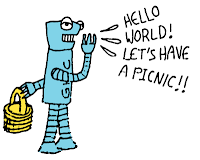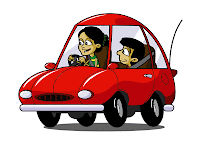http://yvonnecrawford.podbean.com/mf/web/ffgt9/podcast5.mp3
Month: February 2010
St. Valentine’s Day Part 2
I forgot to mention in my podcast from yesterday, that Valentine’s day (also called St. Valentine’s day) is also a big day for weddings in the United States. In fact, my mother and father were married on Valentine’s day. All of the decorations at the wedding were heart-shaped.
A few words I thought I’d go over from the podcast are:
Streamers – they are thin pieces of crepe paper that you hang up at a party. Usually a birthday part.
Fruit punch – this is a drink that is like fruit juice, but usually made without real fruit juice, it just tastes like fruit.
Let me know if you need help with any other words.
As promised, here is the script for podcast number 4.
**********************
Hi, My name is Yvonne. Welcome to The English Guru Podcast #4.
Have you ever wondered how American’s celebrate St. Valentine’s day?
St. Valentine’s day is a day for people to show each other how much they love them.
For children, they have a St. Valentine’s Day party at school.
There are heart shaped decorations all over the classroom.
Red and white streamers come down from the ceiling.
For refreshments, they have heart shaped cookies covered in red icing,
red fruit punch and other treats.
Children either buy or make Valentine Day cards for all of their classmates and friends. They either make them themselves or buy them at a store. Whichever the case, most Valentine’s Day cards have hearts on them. Also, children usually decorate a box or bag and they write their name on it to display in their classroom. It’s kind of like a mailbox. Then, at the party, everyone walks around and puts the valentines in each other’s boxes.
At the end of the party, each child takes out the valentines and reads them and eats the candy that sometimes comes
attached to a card.
For adults it is different, you can give anyone a small present of candy or chocolate, or anything small. But to the one you really love. The person who is your very own Valentine you buy them a special present and take them on a wonderful date to a fancy restaurant.
A man may buy a women flowers, a heart-shaped box of chocolate or jewelry. Or maybe all of those things. But remember men, if you give a woman yellow flowers that means friendships, so you need to buy the woman red roses. Because that symbolizes passion and love.
A woman usually buys the man some small gift, like a wallet or a pocket watch or they make them a very special card or they buy them a card that has a lovely poem written inside it.
That is the end of Podcast number 4. Thank you.
Happy Valentine’s Day!
I hope you enjoy it.
Let me know if you have any questions! http://yvonnecrawford.podbean.com/mf/web/4nxm3v/podcast4.mp3
Try to answer the following questions after listening to the podcast.
2. What food is served at a school Valentine’s day party?
3. What color rose signifies passion and love?
1. flowers, candy, jewelry
2. heart shaped cookies, red fruit punch and other treats
3. red
Learning ways to say good-bye in English!
Here is the link to podcast #3. This podcast is about different ways to say good-bye in English.
http://yvonnecrawford.podbean.com/mf/web/s4tx7e/podcast3.mp3
Below is the script of the podcast. Please leave a comment if you have any questions!
***
Hi my name is Yvonne and this is The English Guru podcast #3. Today I’ll be talking about different ways to say “goodbye” in English. After I repeat the word, I will give you a little time to repeat the word after me. Try to mimic the intonation as well as the sounds.
The most obvious way to say “good-bye” is to simply say, “good-bye.” Repeat this, “Good-bye”
Another way is to just shorten it by saying, “bye.” Repeat, “bye”
You can also say, “bye-bye,” but that is mainly used when speaking to young kids and they will also say it back. Repeat, “bye-bye.”
Other ways to say “Good-bye” are:
“See you later” Repeat, “See you later,”
A very slang way of saying “See you later,” is to say, “Later” or even more slang, “Later, dude.” Those would be used by young people or with close friends. Repeat, ‘Later.” Repeat, “Later dude.”
Another slang expression is to say, “Ta Ta for now.” It just means, “Bye for now,” which is another way to saying “Good-Bye.” Repeat, “Bye for now.” Repeat, “Ta Ta for now.”
A few more examples are:
“See you tomorrow.” Repeat, “See you tomorrow.”
“See you” or ‘See ya” Repeat, “See you.” Repeat, “See ya.”
Here are a few very polite ways of saying “Good-bye.”
“Have a good day.” Repeat, “Have a good day.” “Have a good afternoon.” Repeat, “Have a good afternoon.” “Have a good evening.” Repeat, “Have a good evening.” “Have a good night.” Repeat, “Have a good night.” “Have a good weekend.” Repeat, “Have a good weekend.” And “Have a good week.” Repeat, “Have a good week.”
Lastly, as I pointed out in podcast number 2, you can also say “good night” as good-bye, when you leave someone after about 8pm at night. Repeat, “Good night.” “Good night” “Good night”
Learning greetings in English
 use them.
use them. For example, you can say, “How do you do?” when you meet someone, but in the USA, we don’t use this as much anymore.
What we usually say is “Hi, How are you?” The response would be, “Fine” or “I’m fine, thanks and you?”
So, let’s practice.
“Hi! How are you?”
“I’m fine too, thanks!”
Another greeting would be to just simply say “Hi” or “Hey” or “Hello.” You can say those as you pass someone on the street. It is a polite way to say that in the United States if you see someone in your own neighborhood in the grocery store, for example.
“What’s up?” is a greeting that is used more now. You would use this with people you know fairly well. You wouldn’t use it with your boss or someone you have just met.
You can also say, “How’s it going?” You can say this with friends or people you have just met.
People also use, “Good morning, good afternoon, good evening and good night,” depending on the time of day.
“Good morning” can be used from the wee hours of the morning until about 10am.
‘Good afternoon” and “good evening” are not used often in English, but you can still say them and some people do.
Good night is used right before you go to sleep. You would not greet someone with “Good night.” It’s more of a way of saying, “good-bye.”
Next time I will talk about different ways of saying good-bye in English. Have a great day!
Learn English!
I’m looking forward to helping you learn English!
Practicing the Alphabet
This first podcast is for beginner English students. It will help you practice the English alphabet.
http://yvonnecrawford.podbean.com/mf/web/cnqx64/podcast1.mp3
Enjoy! I hope to be making more podcasts soon. Feel free to leave me a comment if there is a particular topic you’d like me to discuss.
Below is a copy of the podcast script, in case you want to read it while listening to the podcast. However, it is probably best to listen to the podcast at least 1 time before reading the script.
Have a great weekend!
**********************************************************
Podcast #1
Hi, my name is Yvonne. This is The English Guru podcast #1 and today we are going to start at the beginning with the alphabet. Repeat the letters after me…A-B-C-D-E-F-G-H-I-J-K-L-M-N-O-P-Q-R-S-T-U-V-W-X-Y-Z
Learning how to say the letters properly is important for when someone asks you to spell your name or the street you live on. Let’s practice that.
My name is Yvonne. You spell it Y-V-O-N-N-E. Now you try with your name.
I live on smith Street. You spell it S-M-I-T-H. You can give it a try too.
Sometimes on the phone it’s hard to hear the letters of the alphabet and some letters like d and b sound the same. Because of this some people spell things like this:
I live on Branch Street. B as in boy, R as in Rat, A as in Apple, N as in Nancy, C as in Cat and H as in Hop
You can practic that and then come back for podcast #2 where I will talk about greetings.
Speaking about Sports in English
 As an English teacher, in the past a lot of my students made mistakes when talking about different sports. Sometimes you use the verb ‘play’ before the sport name and sometimes you don’t. I’m going to list a few of the expressions when speaking about different sports in English.
As an English teacher, in the past a lot of my students made mistakes when talking about different sports. Sometimes you use the verb ‘play’ before the sport name and sometimes you don’t. I’m going to list a few of the expressions when speaking about different sports in English.
Making conversation in English
So, you’ve said ‘hi’ and you’ve told you new potential friend your name and asked them theirs. Now what?
Usually people start by asking questions like:
“What do you do (for a living)?”
“What are you studying (in college)?”
“Where do you live?”
You can keep things very light. I know in some countries it’s okay to ask someone how much money they make, but in the states, it’s not polite. In fact, rarely do people tell others how much they make even if they are pretty good friends.
Here’s a role play you can do now:
Me – “Hi, How are you?”
You –
Me – “I’m good, thanks! What’s your name?”
You –
Me – “My name is Yvonne. What do you do for a living?”
You –
Me – “Wow, sounds fascinating! I’m a teacher. I really love my job. Where do you live?”
You –
Me – “Me? I live in South Carolina. What kinds of things do you like to do in your freetime?”
You –
Me – “I love to go hiking and swimming and pretty much anything that you do outdoors. I’ve got to run now. It was nice meeting you.”
You –
Me – “Good-bye!”

